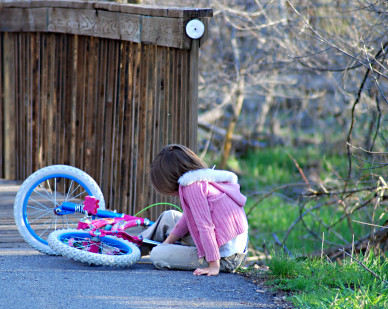“I have not failed. I’ve just found 10,000 ways that won’t work.”
― Thomas Edison
Did you recently go to a teacher-parent conference and leave feeling a bit unsettled? I know, from the looks of my email inbox, that a lot of parents are starting to worry about their children’s academic performance.
Your children are lucky that you are worrying; it means you care about them. But here’s a thought: Perhaps their mediocre performance is not an indicator of an innate weakness or a downward trajectory in one arena or another.

Painful as they can be (to the kids and to us parents), mistakes and micro-failures are the most useful part of an education. This idea is backed up by new research from Jason Moser at the University of Michigan.
Here’s why: When our kids make mistakes, they have the opportunity to learn what it takes to get it right.
There are two approaches that we parents—and teachers—can take when a kid stumbles in school.
The first approach is to simply ignore a poor musical performance, shoddy spelling in a reading log, or a few clear misses on a math quiz—especially if the mistakes are occasional, or we aren’t sure what to do (nagging them to study more isn’t working). Calling attention to mistakes and embarrassing moments can be really painful for some kids, after all, and we don’t want them to start seeing themselves as lesser-than or not-good-enough.
OR. We can call attention to their mistakes, and use them as opportunities for deeper learning. Moser’s new research clearly shows that this second approach is better for them in the long run, even if it causes some short-term slights to their self-esteem.
If you are a mistake-fixing-parent (Test yourself: Have you recently brought forgotten homework or lunch to school? When your kids are unsettled by a challenge, do you let them quit or over-help them?), here are some reasons why covering for our children’s mistakes, painful gaffes, and embarrassing moments may hurt more than help.
When we cover for their mistakes, kids learn:
1.That it must be really horrible to make a mistake, or their mom or dad wouldn’t always be covering for them.
2.That they don’t have the ability to recover on their own in a challenging situation.
And they don’t learn:
3.How to tolerate the discomfort that comes from challenging themselves and taking risks, as well as from facing their mistakes so that they can learn from them.
Most importantly, perhaps, when we fix things for our kids, they don’t end up paying attention to the mistakes they’ve made. Research shows that the people who are most effective at learning from their mistakes pay more attention to them, even when it is uncomfortable for them to do so. Those who don’t learn much when they make a mistake tend to ignore the error, often to save face.
When kids make mistakes (in their homework, for example) what they need is more practice or instruction—and a teacher or parent who believes that given these things, pretty much anyone can get better at almost anything.
Here is where the growth-mindset strikes again: If you believe that mistake-riddled homework can be taken as an indicator of an innate weakness, or something that a child will “probably always struggle with,” please read up on how your fixed-mindset may be affecting your child’s performance and engagement in school.
As it turns out, our beliefs about learning and intelligence are a critical determinant of how well we bounce back from mistakes. The more growth-mindset our kids are—the more they believe that intelligence develops through effort—the greater attention they will pay to their mistakes, and the more they will learn.
Key reference:
Moser, Jason, and Hans Schroder, Carrie Heeter, Tim Moran, and Yu-Hao Lee, “Mind your errors: Evidence for a neural mechanism linking growth mindset to adaptive post-error adjustments,” forthcoming in the November issue of Psychological Science.
—-
© 2011 Christine Carter, Ph.D.
Become a fan of Raising Happiness on Facebook.
Follow Christine Carter on Twitter
Sign up for the Raising Happiness monthly newsletter.


Comments